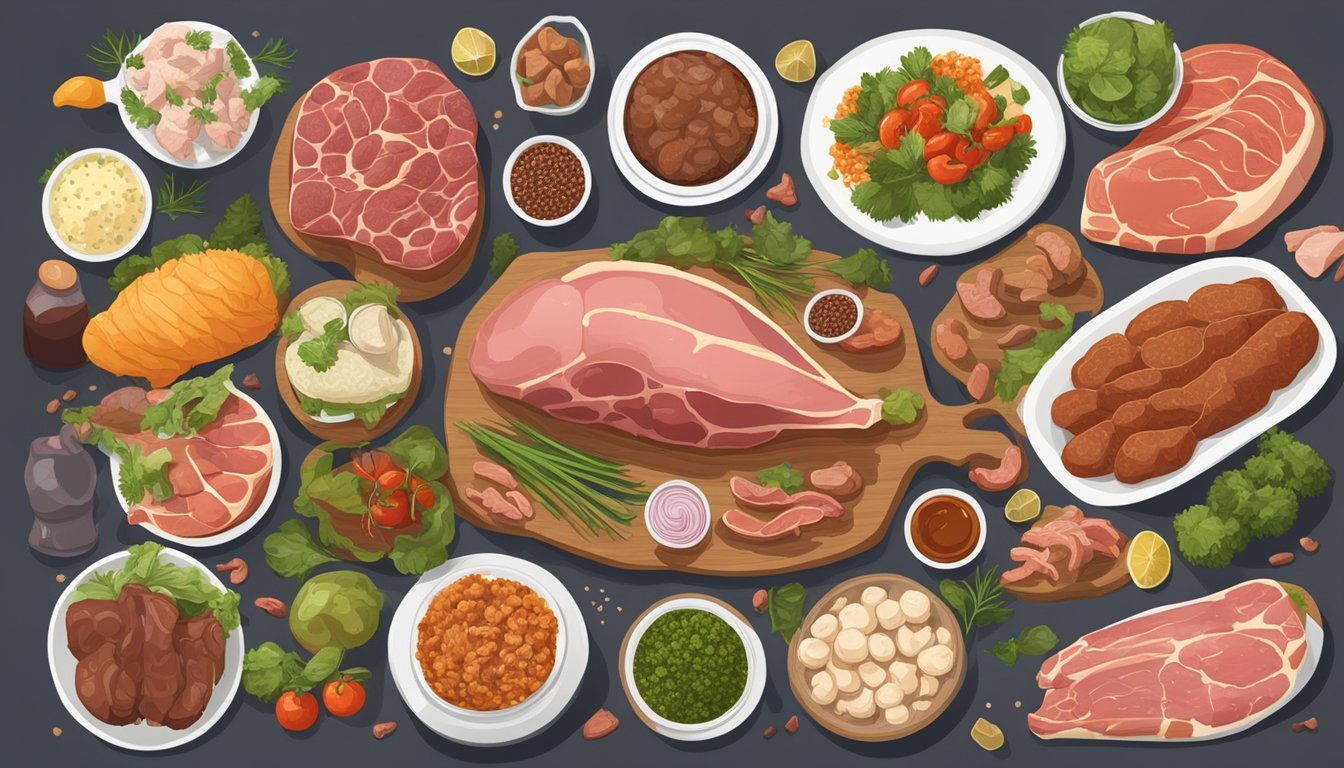Carnivore Diet & Fatty Liver
Examining Potential Risks and Precautions
This Article is Part Of Our Guide on the Carnivore Diet
The carnivore diet, which is high in animal products and excludes all plant-based foods, has been under scrutiny for its potential impacts on liver health. This diet predominantly includes meat, fish, eggs, and dairy while omitting fruits, vegetables, grains, and legumes, reflecting specific dietary habits that may influence liver health. The broader implications of dietary habits on human health, particularly in relation to liver disease, are significant, as they can affect overall metabolic conditions, disease prevalence, and even the possibility of developing cardiovascular disease. Its advocates suggest benefits such as weight loss, lower inflammation, and enhanced mental clarity. The liver, a critical organ for metabolism and detoxification, may experience varying effects under such a dietary regime.
Fatty liver disease, specifically non-alcoholic fatty liver disease (NAFLD), is a condition characterized by an excess accumulation of fat in liver cells. NAFLD can lead to liver inflammation, scarring, and potentially liver failure if progression is not managed. The development of this disease is multifactorial, with diet playing a substantial role. Initial research and anecdotal evidence suggest that a carbohydrate-restricted diet, like the carnivore diet, may lead to improvements in liver health and a reduction in the severity of NAFLD.
Considering dietary interventions for fatty liver disease, the carnivore diet’s potential to improve liver health warrants attention. Although the removal of sugars, grains, and alcohol can be beneficial for liver function, it is vital to approach such dietary changes with caution and to seek guidance from healthcare professionals to ensure comprehensive nutritional adequacy and to address any underlying health concerns.
Understanding Fatty Liver Disease
Fatty liver disease, a common condition with serious health implications, encompasses various forms that can progress to chronic liver damage if left unmanaged. The disease's association with diet, particularly the role of a meat-centric carnivore diet, has been a subject of recent discussions and studies.
Definition and Types of Fatty Liver Disease
Fatty liver disease (FLD) is a condition characterized by the excessive accumulation of fat in liver cells. There are two main types of FLD:
Alcoholic fatty liver disease (AFLD): Results from heavy alcohol consumption.
Non-alcoholic fatty liver disease (NAFLD): Occurs in individuals who drink little to no alcohol.
NAFLD may progress to nonalcoholic steatohepatitis (NASH), which involves inflammation and can lead to fibrosis, cirrhosis, and liver failure.
Causes and Risk Factors
Several key factors contribute to the development of NAFLD and NAFL, some of which include:
Obesity** and insulin resistance**: Central to NAFLD development.
Genetics: Family history can increase the risk.
Diet: High intake of certain fats and sugars, which are part of an unhealthy dietary pattern.
Metabolic syndrome: Conditions like diabetes and hyperlipidemia.
Lifestyle: Sedentary behavior and poor nutritional habits.
Certain dietary patterns, such as high fructose and carbohydrate intake, contribute to a high risk of developing NAFLD.
Risk factors are not limited to these, and other health issues may also play a role in the severity of liver disease.
Symptoms and Diagnosis
Most people with fatty liver disease do not exhibit symptoms, especially in the early stages. When symptoms present, they may include:
Fatigue
Weight loss
Upper right abdominal discomfort
Diagnosis usually involves:
Medical history and physical exam: To check for risk factors and signs like an enlarged liver.
Blood tests: Liver function tests, including alanine aminotransferase (ALT), may present abnormalities.
Imaging: Ultrasound, CT, or MRI may detect fat in the liver.
Liver biopsy: Required to confirm NASH and determine the stage of liver damage.
Early diagnosis is crucial to manage the disease effectively and prevent the progression of liver damage.
Alcoholic Fatty Liver Disease
Alcoholic fatty liver disease (AFLD) is a type of fatty liver disease caused by excessive alcohol consumption. It is estimated that approximately 90% of heavy drinkers develop AFLD. The pathogenesis of AFLD involves the toxic effects of alcohol on liver cells, leading to inflammation, oxidative stress, and lipid accumulation. AFLD can progress to more severe conditions such as alcoholic hepatitis, fibrosis, and cirrhosis. Abstinence from alcohol is the primary treatment for AFLD, and medications such as corticosteroids and antioxidants may be used to manage symptoms and prevent progression.
The Carnivore Diet: An Overview
The Carnivore Diet emphasizes the exclusive consumption of animal products and is marked by its elimination of plant-based foods. This section provides a detailed look at its primary components, potential benefits, and the critiques it faces.
Primary Components of the Carnivore Diet
The Carnivore Diet consists almost entirely of fish, and other animal products. Principal foods include:
Meats: Beef, pork, lamb, and wild game
Fish: Salmon, mackerel, and sardines (how long do sardines last?)
Animal Products: Eggs and certain forms of dairy
Eggs and dairy such as cheese and butter can be incorporated, although some variations of the diet may limit or omit dairy products depending on an individual's tolerance.
Potential Benefits
Those who follow the Carnivore Diet often report improvements in body weight and a reduction in symptoms of depression and inflammation. Proponents argue that the diet's high protein and fat content can lead to a state of ketosis, thereby promoting fat loss and increased mental clarity.
Critiques and Considerations
Critics of the Carnivore Diet point out potential health risks due to the high saturated fat intake, which can lead to an increased risk of fatty liver disease and elevated levels of LDL cholesterol. Low meat consumption may be linked to reduced risk factors for liver diseases, suggesting that dietary patterns with less red meat could benefit liver health. Additionally, the lack of dietary fiber, which is absent in animal foods, may have implications for gut health and long-term digestive function. The exclusion of plant-based foods can also lead to deficiencies in important vitamins, further impacting overall health and wellness.
Carnivore Diet and Liver Health
In examining the relationship between a carnivore diet and liver health, key considerations include the diet's impact on liver function, its role in non-alcoholic fatty liver disease (NAFLD), and the implications of obtaining essential nutrients.
Impact on Liver Function
The liver plays a crucial role in metabolism, and animal-based diets can influence its functions. The carnivore diet, which is high in protein and fat from animal sources, can lead to changes in the liver's processing of these macronutrients. While some claim that increased production of bile acids and improvements in insulin sensitivity support liver health, the diet's high content of saturated animal fat warrants caution.
Carnivore Diet and NAFLD
Non-Alcoholic Fatty Liver Disease (NAFLD) is characterized by the accumulation of excess fat in the liver cells. Research suggests that dietary choices significantly impact NAFLD’s progression or improvement. Linoleic acid, a pro-inflammatory omega-6 fatty acid, can impact liver health. The carnivore diet, with its absence of carbohydrates, may offer some relief in liver fat reduction, but it is crucial to monitor liver function closely due to the potential risks associated with high levels of dietary saturated fat. Examining diet associations reveals how specific dietary habits influence the risk of developing NAFLD, highlighting the importance of nutrient intake on liver health.
Nutrient Considerations for Liver Health
An optimal diet for liver health should include a range of vitamins and minerals to support hepatic function. A carnivore diet may be rich in certain nutrients such as B vitamins and zinc; however, it may lack others commonly found in plant-based foods, like vitamin C and E, known for their antioxidative properties beneficial to liver health:
Vitamins: Essential for enzymatic functions
B Vitamins: Abundant in meat
Vitamin C and E: Generally low in a carnivore diet
Minerals: Crucial for various biochemical processes
Zinc: Found in meat
Others (like magnesium and potassium): May require attention
It is important to balance nutrient intake and consider supplementation when necessary to ensure the liver receives all the micronutrients it needs to function optimally.
The Role of Heme Iron in Fatty Liver Disease
Heme iron, a component of red meat, has been implicated in the development of fatty liver disease. High heme iron intake can lead to increased oxidative stress, inflammation, and lipid peroxidation in the liver, contributing to the progression of fatty liver disease. A prospective cohort study found a significant association between high red meat consumption and increased risk of nonalcoholic fatty liver disease (NAFLD). The Golestan Cohort Study, a population-based cohort study, also found a positive association between red meat intake and liver fat accumulation. Reducing heme iron intake through dietary changes, such as decreasing red meat consumption, may help mitigate the risk of fatty liver disease.
Nutritional Aspects of Fatty Liver Disease
Nutritional management plays a critical role in the progression or mitigation of fatty liver disease. An individual's diet can influence liver fat accumulation, inflammation, and overall liver function.
Role of Macronutrients
Protein: Adequate protein intake is essential for liver health. Total energy intake is a crucial factor in dietary assessments, impacting liver health by influencing overall nutrient balance. One should include lean or plant-based proteins to support liver function and repair without excessively increasing calories that may contribute to liver fat.
Fats: The type of fats consumed significantly impacts fatty liver disease. It’s important to reduce intake of saturated fats and increase omega-3 fatty acids, which have a protective effect on the liver. Foods like salmon, flaxseeds, and walnuts are beneficial.
Fiber: A diet high in fiber, particularly from fruits, vegetables, and whole grains, helps manage non-alcoholic fatty liver disease (NAFLD) by improving insulin sensitivity and reducing the absorption of fats and sugars. The interaction of dietary fat intake patterns with other nutrients can significantly influence liver health outcomes.
Micronutrients and Liver Health
Vitamins and Minerals: Essential vitamins and minerals like vitamin E, zinc, and selenium support liver health by acting as antioxidants. A deficiency in these nutrients can impair liver function.
Antioxidants: Antioxidants neutralize harmful free radicals that may damage liver cells. Therefore, including antioxidant-rich foods, such as berries and green leafy vegetables, is crucial for maintaining liver health.
Dietary Patterns for Managing Fatty Liver
Adhering to a balanced diet that incorporates a variety of food groups can manage and even reverse NAFLD. Different dietary patterns significantly impact liver health, particularly in the context of nonalcoholic fatty liver disease (NAFLD). Key components include:
Grains: Opt for whole grains over refined ones.
Fruits and Vegetables: Focus on high-fiber produce for antioxidant support.
Meat and Beans: Choose lean meats and legumes for protein.
Milk: Low-fat or plant-based milk can provide necessary calcium without added fat.
Oil: Use oils high in unsaturated fats, like olive oil, sparingly.
Overall, individual dietary needs may vary, and it’s advisable to consult a healthcare provider for personalized recommendations. Gathering extensive dietary information through methods like food frequency questionnaires and 24-hour dietary recalls supports the exploration of different dietary patterns regarding meat consumption and their associations with liver health.
Reversing Fatty Liver Disease
Reversing fatty liver disease requires a comprehensive approach that involves lifestyle modifications, dietary changes, and, in some cases, pharmacological interventions. Weight loss, through a combination of diet and exercise, is a crucial step in reversing fatty liver disease. A systematic review of randomized controlled trials found that weight loss of 5-10% of initial body weight can lead to significant improvements in liver function and reduction in liver fat. Dietary changes, such as increasing consumption of whole grains, fruits, and vegetables, and reducing intake of saturated fats and processed foods, can also help reverse fatty liver disease. Additionally, certain nutrients, such as omega-3 fatty acids and antioxidants, may have beneficial effects on liver health.
Alternative Diets and Liver Health
In the context of liver health, certain dietary patterns can provide essential nutrients and reduce liver damage. This section explores alternative diets that may contribute to a healthier liver.
Mediterranean Diet
The Mediterranean diet is renowned for its potential to decrease liver fat, thus supporting the prevention and management of non-alcoholic fatty liver disease. Individuals adhering to a Mediterranean-like diet experience a lower prevalence of metabolic syndrome, indicating significant metabolic benefits. It prioritizes healthy fats like olive oil, an array of fruitsvegetables, whole grainsnutslegumesseeds. Fresh fishseafood feature prominently several times a week, while poultryeggscheeseyogurt are consumed in moderation. This diet suggests reserving sweets and red meat (What wine goes well with red meat?) for occasional indulgences, contributing to a reduced risk of NAFLD.
Plant-Based Diet Considerations
A plant-based diet, which can include a vegan lifestyle, focuses on fruits, vegetables, whole grainsnuts, seedslegumes. Such a diet is rich in fiber and antioxidants but must be carefully planned to ensure adequate protein intake and essential nutrients. Embracing a variety of plant-based foods can result in a balanced intake that supports liver health. However, individuals should ensure they're not missing out on vital nutrients often sourced from animal products, such as vitamin B12, iron, and omega-3 fatty acids.
Balancing Animal and Plant Intake
For individuals not strictly adhering to plant-based diets, balancing animal protein intake with plant consumption is suggested. Options include lean cuts of meat and diverse protein sources to minimize saturated fat intake and to provide essential nutrients. Incorporating healthy fats from both animal and plant sources can be beneficial, while legumes, nuts, and seeds can offer added fiber and nutrients to round off the diet.
Risks and Side Effects of High Meat Consumption
When focusing on a carnivore diet, it is crucial to explore the potential risks and side effects associated with high meat consumption. These include increased risk of heart disease, cancer, and impact on blood pressure and cholesterol levels
Long-Term Health Implications
High consumption of meat, especially red meat, on a carnivore diet may lead to long-term health challenges. Certain studies associate a diet high in red and processed meats with an increased risk of type 2 diabetesheart disease, and certain types of cancer. Additionally, excessive meat intake without the balance of other food groups can affect blood pressure and cholesterol levels negatively.
Red Meat and Health Risks
The type of meat consumed is a significant factor in assessing health risks. Red meat, comprising beef, pork, and lamb, contains higher levels of saturated fat and cholesterol compared to leaner meats like poultry or fish. Studies have shown that the odds ratio of developing non-alcoholic fatty liver disease (NAFLD) is significantly higher with increased red meat consumption. Here’s how red meat can impact health:
Heart Disease: Saturated fats can increase cholesterol, leading to a higher risk of heart disease and cardiovascular disease.
Cancer: Some evidence suggests a correlation between red meat and an increased risk of colorectal cancer.
Blood Pressure: High sodium levels in processed meats can contribute to elevated blood pressure.
Recommendations and Moderation
Moderation is key to mitigating the risks associated with a carnivore diet's high meat consumption. For those choosing a carnivore lifestyle, it is recommended to include a variety of meats and prioritize leaner choices. They should also consider:
Balancing red meat intake with other protein sources like poultry and fish.
Including organ meats which may offer a broader range of nutrients.
Seeking medical advice for personalized dietary recommendations.
By being cautious about meat selection and consumption frequency, one may reduce the potential health risks linked to a carnivore diet.
Lifestyle Factors Affecting Fatty Liver
The lifestyle choices an individual makes can significantly impact the development and progression of fatty liver disease. Regular exercise, maintaining a healthy weight, moderating alcohol intake, and managing blood sugar levels are critical components for liver health.
Importance of Exercise
Regular physical activity is essential in preventing and managing nonalcoholic fatty liver disease (NAFLD). Exercise can reduce visceral fat accumulation, which significantly impacts liver health by lowering the risk of conditions like non-alcoholic fatty liver disease. It can enhance energy levels and help in weight loss, which in turn reduces liver fat. At least 150 minutes of moderate-intensity exercise weekly is recommended.
Weight Management and Obesity
Obesity is closely linked with the accumulation of fat in the liver. Maintaining a healthy weight through balanced diet and physical activity reduces the risk of developing NAFLD. Weight loss for overweight or obese individuals can significantly diminish liver fat content.
Alcohol Consumption
While moderate alcohol use might have some health benefits, excessive consumption is a known risk factor for liver disease. Abstaining from alcohol or consuming it in moderation is critical as it allows the liver to metabolize fat more effectively, preventing fatty liver disease.
Managing Blood Sugar and Insulin
Blood glucose and insulin resistance have a direct impact on liver health. Managing blood sugar and insulin can also influence lipid metabolism, which is crucial for maintaining liver function and reducing inflammation. A diet high in refined sugars can lead to increased liver fat. Therefore, managing insulin levels through a balanced diet and regular exercise is crucial for reducing the risk of NAFLD.
Blood Pressure and Liver Health
Blood pressure is an important factor in liver health, as hypertension can exacerbate liver damage and increase the risk of liver disease. A prospective study found that individuals with hypertension were more likely to develop NAFLD and experience liver damage. The mechanisms underlying the relationship between blood pressure and liver health are complex and involve the activation of various signaling pathways that promote inflammation, oxidative stress, and lipid accumulation in the liver. Managing blood pressure through lifestyle modifications, such as regular exercise, weight loss, and dietary changes, and pharmacological interventions, such as antihypertensive medications, is essential for maintaining liver health.
Gut Microbiota and Liver Health
The gut microbiota plays a crucial role in liver health, as it influences the metabolism of nutrients, the production of hormones and bile acids, and the regulation of inflammation and immune responses. An imbalance of the gut microbiota, also known as dysbiosis, has been implicated in the development of fatty liver disease. A multiethnic cohort study found that individuals with NAFLD had altered gut microbiota composition and function compared to healthy controls. Modulating the gut microbiota through dietary changes, such as increasing consumption of fiber-rich foods, and probiotics may help improve liver health and reduce the risk of fatty liver disease.
Consulting Healthcare Professionals
When considering significant dietary changes, such as adopting a carnivore diet, consulting healthcare professionals is crucial. They provide guidance to ensure that the changes support the individual's health needs and assess potential impacts on conditions like fatty liver.
When to Seek Medical Advice
One should seek medical advice if they are considering the carnivore diet for managing fatty liver disease. In clinical studies related to dietary interventions for managing fatty liver disease, obtaining written informed consent from participants is crucial to ensure ethical standards and voluntary participation. Healthcare professionals can offer important medical advice about the risks and benefits associated with such a restrictive diet. Furthermore, they can monitor liver function and overall health to safely implement these lifestyle changes.
Signs that warrant a medical consultation include:
Unexplained weight loss or gain
Fatigue or weakness
Abdominal pain or bloating
Yellowing of the skin or eyes (jaundice)
Healthcare providers may suggest regular check-ups to track the health progression and adjust the dietary plan as required.
Working with a Dietitian or Nutritionist
For those with fatty liver disease, working with a dietitian or nutritionist can help design a healthy diet tailored to personal needs, ensuring all nutritional requirements are met. Nutritional epidemiology plays a crucial role in understanding dietary patterns and their impact on liver health, particularly in how specific nutrient intakes can influence the prevalence of conditions like nonalcoholic fatty liver disease (NAFLD). This collaboration is particularly beneficial to:
Create a balanced meal plan that:
Addresses nutrient needs
Considers personal health goals and preferences
Offer education about:
Food choices that support liver health
Portion sizes and frequency of meals
Set realistic expectations about:
Weight management
Progress over time
They can also provide support and strategies for maintaining lifestyle changes with a long-term perspective.
Conclusion
The Carnivore Diet's impact on liver health, particularly concerning fatty liver disease, has become a subject of intense discussion. Fatty liver disease, or hepatic steatosis, is a condition where excessive fat accumulates in the liver, potentially progressing to more serious liver damage if left unaddressed.
Those who advocate for the Carnivore Diet suggest that its meat-based nutrition can decrease inflammation and aid weight loss, potentially benefiting those with fatty liver disease. However, the diet's exclusion of plant-based foods raises questions about its long-term effects on liver health, considering that a varied diet is generally recommended for maintaining health.
Understanding liver health requires acknowledging that lifestyle changes and balanced nutrition are key components. The Carnivore Diet, while restrictive, may offer short-term improvements in individuals by simplifying dietary choices and reducing caloric intake, which can lead to weight loss—a positive outcome for those with fatty liver disease.
In conclusion, although some evidence indicates potential benefits, the Carnivore Diet's long-term sustainability and its effects on liver health are still being rigorously studied. It is crucial for individuals to consult healthcare professionals before making significant dietary changes, particularly those with health conditions like fatty liver disease, to ensure they do not compromise their nutritional needs and overall health.







